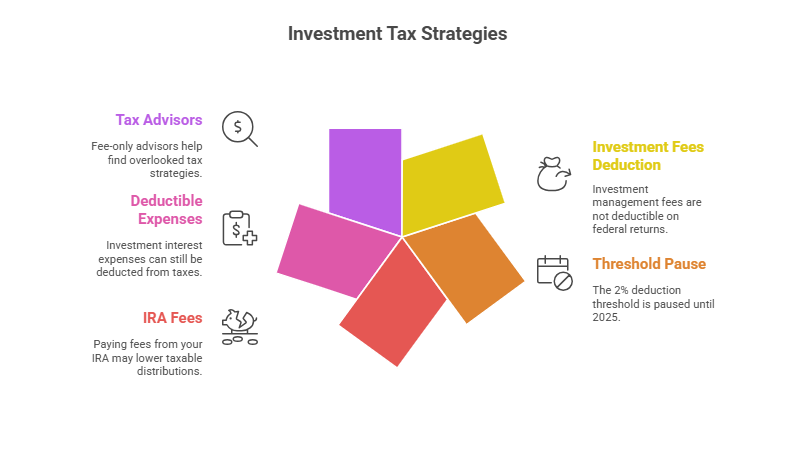
Maximize Your Savings: Are Investment Management Fees Tax Deductible?
Are investment management fees tax deductible? The short answer is no, at least not until 2025 under the Tax Cuts and Jobs Act (TCJA). But if you’re also wondering, “Are investment management fees tax deductible, how does the 2% threshold work, do I still qualify for a deduction, can I pay from my IRA for a tax break, or might the rules change in 2025?” then you’re in the right spot. Below is a quick rundown of seven important considerations to keep in mind when you’re planning to maximize savings on your investment costs.
Recognize The Current Law

Under the TCJA, most investment-related expenses are no longer deductible on your federal tax return. This shift started in 2018 and runs through 2025. According to the IRS, fees for portfolio management, tax advice, and financial planning used to be considered “miscellaneous deductions,” but are now disallowed. Many high-net-worth individuals choose a fee-only advisor who can still add value through tax planning, even when fees aren’t deductible.
Note The 2% Threshold

Before the TCJA, the 2% threshold applied to fees you could deduct if they exceeded 2% of your adjusted gross income (AGI). For example, if your AGI was $200,000, you could deduct the portion of fees above $4,000. Today, that option is off the table until at least 2025. To explore how fees might affect your bottom line, try our investment cost calculator.
Look Ahead To 2025

Current tax law could bring back the deductibility of investment management fees if Congress doesn’t renew the TCJA. Some experts suggest you monitor legislative updates, because there’s a possibility the deductions may return after 2025, either in full or with new stipulations. Keep an eye on reputable sources like InvestmentNews to stay informed.
Understand IRA Fee Payments

Here’s a pro tip: if you pay your advisor’s fees directly from a traditional IRA, you might avoid recognizing that amount as income. Though it’s not a “deduction” in the usual sense, you effectively reduce your IRA balance by the fee, lowering your taxable distributions later. InvestmentNews points out that this strategy can be a sensible way to manage advisor costs without losing extra tax dollars.
Explore Investment Interest Deductions

While management fees are off the table, you can still deduct certain investment interest expenses if you itemize on Schedule A. This includes interest paid on margin loans for taxable investments. Check the guidelines at SmartAsset for more on how to claim interest on borrowed money that funds your investment activity.
Consider Tax Loss Harvesting

Despite the fact that your management fees aren’t generally deductible, you could reduce tax obligations through tax loss harvesting (selling underperforming assets to offset capital gains). Just watch out for the IRS wash sale rule: if you buy a “substantially similar” asset within 30 days before or after selling at a loss, you’ll forfeit the tax benefit. If you’re curious about how these strategies fit into your overall advisor costs, check out cost of a financial advisor.
Choose The Right Advisor

Even when your management fees aren’t deductible, a knowledgeable advisor can help you optimize other tax strategies. Fee-only or flat-fee advisors might be easier to budget for, depending on your asset level. If you want a deeper look at how advisors earn or structure their costs, visit how do financial advisors earn money. The right professional can guide you through multi-generational wealth planning, charitable giving, and even specialized services like flat fee cfp for a more transparent cost structure.
Review Key Insights

In a nutshell, here’s what you need to remember:
- You can’t currently deduct investment management fees on your federal return.
- The 2% threshold is paused until at least 2025.
- Paying fees directly from your IRA may reduce taxable distributions.
- You can still deduct investment interest expenses and leverage tax loss harvesting.
- Fee-only advisors can help you uncover overlooked tax strategies.
Even if the rules about tax-deductible fees change, staying informed will help you protect your wealth. Have a question or tip about working with financial advisors? Feel free to share your thoughts or experiences, because when it comes to your portfolio, every little bit of advice can make a big difference!
Recent Posts
Financial Advisors in Los Angeles to Consider
Finding the right financial advisor can be a pivotal step...
Financial Advisors in New York to Consider
Selecting the right financial advisors in New York can play...





